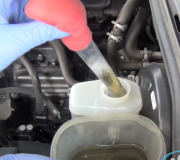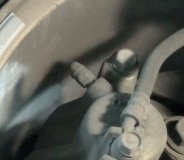Saturday, July 1st, 2023 AT 10:03 PM
This is a 1998 Ford E-150 Econoline Club Wagon. I tried to replace the front caliper bleeder screws because they were rounded off. I purchased aftermarket bleeder screws, which supposedly fit this vehicle. The formed tip on the new screws are narrower than the original screws and I believe they are also a hair longer than the original ones. Anyway, I installed them thinking they would be fine; however, the new screws would not snug up. They kept rotating as I tried to tighten them until they bottomed up (but still did not get tight). When my helper pushed on the brake pedal, brake fluid seeped through the screw threads, so I reinstalled the original ones. The problem now is that, with the original screws installed, when you push on the brake pedal, brake fluid comes out of the center of the bleeder screws (as if the screw was loose) even though they are tightened properly. My questions are: Is it possible that the aftermarket screws messed up the seat inside the caliper OR another issue is causing the original screws to leak from the center? And if the seat inside the calipers became messed up, is there a way to fix the calipers or do they need to be replaced at this point? If there is a fix, please let me know how to do it. Thanks


